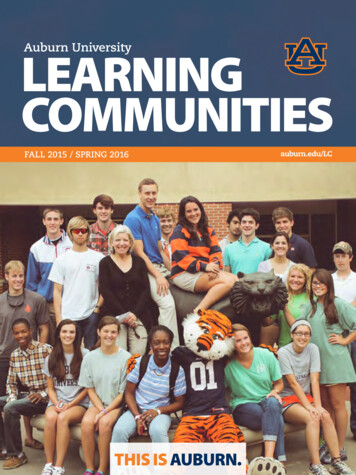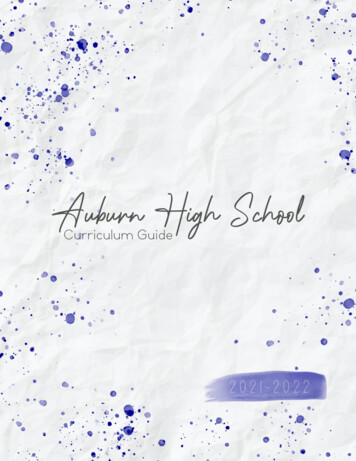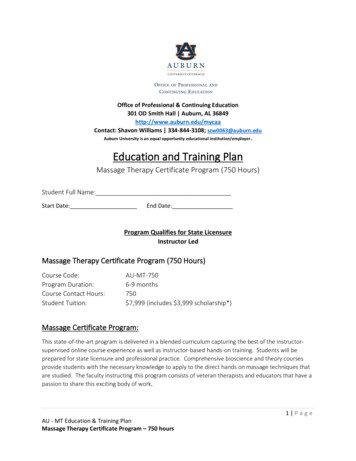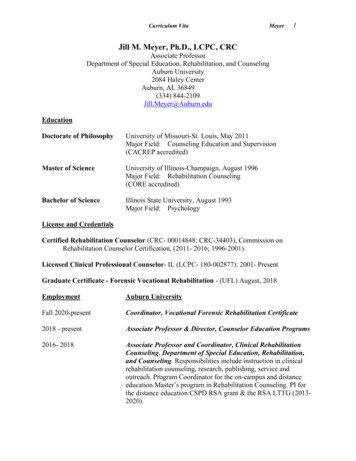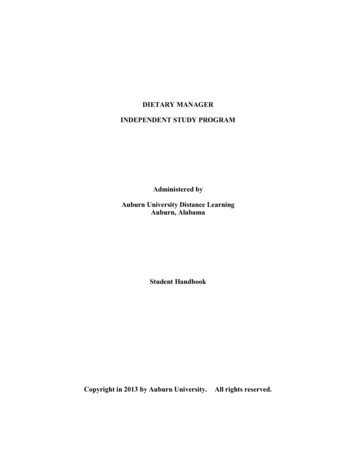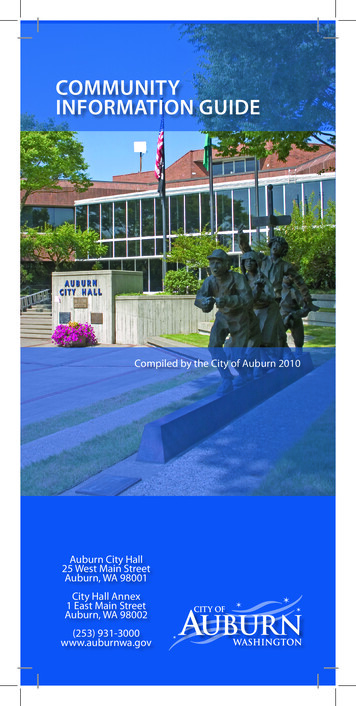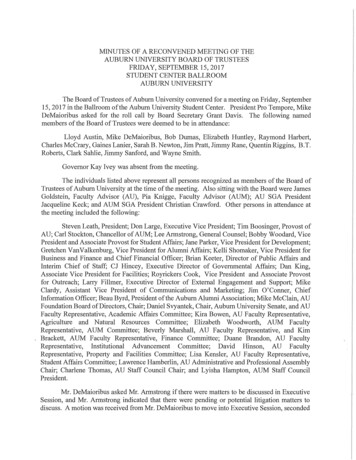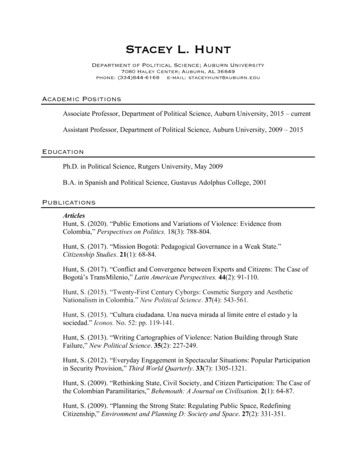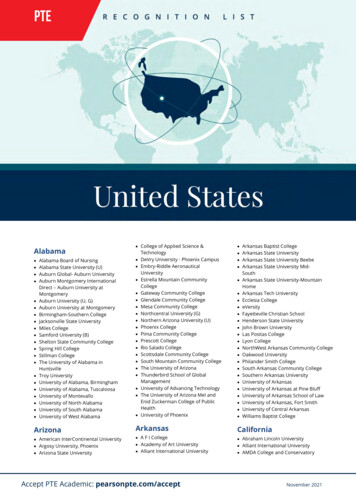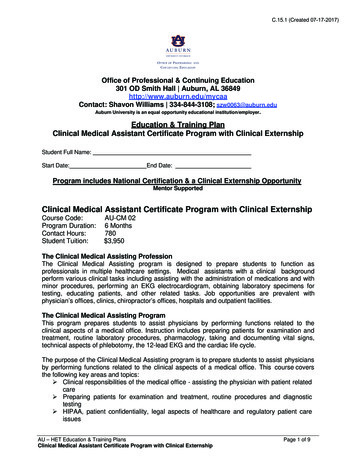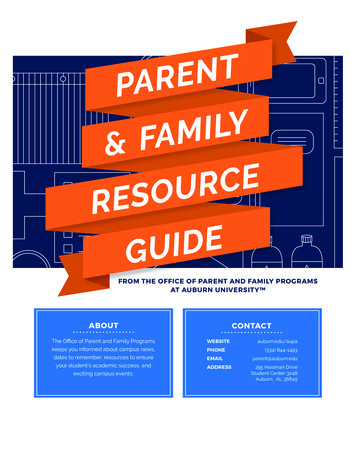
Transcription
TNEPARYLIMAF&ECRUOSREEDIGUFROM THE OFFICE OF PARENT AND FAMILY PROGRAMSAT AUBURN UNIVERSITY ABOUTThe Office of Parent and Family Programskeeps you informed about campus news,dates to remember, resources to ensureyour student's academic success, andexciting campus upa(334) 844-1493parent@auburn.edu255 Heisman DriveStudent Center 3248Auburn, AL 36849
1ABOUT THE OFFICE OFPARENT AND FAMILY PROGRAMSThe Office of Parent and Family Programs is your one-stop-shop for allquestions while your student is at Auburn University. Located in the Divisionof Student Affairs, Parent and Family Programs is the one office on campusdesigned specifically to serve you.MEET THE STAFF:Tess Gibson joined the Office of Parentand Family Programs as Coordinator inMay 2014. Tess is a two-time alumnafrom Auburn University. She earnedher Bachelor of Arts in PoliticalScience with a concentration in PublicAdministration, and then completedher Masters in Administration ofHigher Education. Prior to her time working with Parent andFamily Programs, Tess served as a graduate assistant in bothFirst Year Experience and Student Involvement.HOW TO JOIN:– Online at www.auburn.edu/joinaupa.– Email parent@auburn.edu.– Parent and Family Programs guide within the free mobileapplication, Auburn Guides.AUBURN UNIVERSITYPARENTS’ ASSOCIATION:Participating in the Auburn University Parents’ Association(AUPA) is an excellent way to stay connected as a partof the Auburn Family and support the education of yourstudent. As a member, you will receive information regardingimportant dates, deadlines and events that are relevant toyou and your student.Through activities such as Home Sweet Auburn and FallFamily Weekend, the Parents’ Association provides you withopportunities to meet Auburn administrators and faculty,socialize with other parents, and actively participate in theAuburn Family.BENEFITS OF MEMBERSHIP:Joining the AUPA is free! Here are some of the benefits ofmembership:– Access to the Auburn University Family Portal, customized toyour needs and interests.– Access to dedicated AUPA Board representative.– Higher student retention from first to second year.– Increased 4-year student graduation rates.– Eligibility to serve on the AUPA Board of Directors.
2ENGAGE WITH PARENT& FAMILY PROGRAMSSOCIAL MEDIA:AUBURN GUIDES:The Office of Parent and Family Programs strives to providefamilies with current and relevant information to help yourstudents’ success. Follow Parent and Family Programs onsocial media to join fellow Auburn parents in the conversationof what matters to your student.Auburn Guides is a free mobile application that brings Auburnto your fingertips. Within Auburn Guides, download the Parentand Family Programs guide for parent-specific tips, resources,and contacts.FACEBOOK: facebook.com/AuburnParentsTWITTER: twitter.com/AuburnParentsLINKEDIN: Auburn University Parents' AssociationSave the Date:HOME SWEET AUBURNJoin the Office of Parent and Family Programs for Home SweetAuburn, an event welcoming parents and students to AuburnUniversity and the city of Auburn. Through collaboration withthe Auburn Chamber of Commerce, Welcome Week, andthe Student Government Association, Home Sweet Auburnwill introduce you to all of the fantastic places to eat in town.Home Sweet Auburn will take place on Thursday, August 16,2018 on the Campus Green, adjacent to the Auburn UniversityStudent Center.AU B UR N August 16, 2018LLFA M aupa ILYFAFALL FAMILY WEEKENDThis annual event serves as an opportunity for families toWEEKEND Se p te mbe r 2 8-3 0, 2 01 8AUBURNUNIVERSITY experience campus life while attending activities duringHomecoming weekend. Fall Family Weekend will take placeSeptember 28 - 30, 2018. Registration begins on Monday, July30, and will close on Sunday, September 23. Register online atwww.auburn.edu/aupa.In the past, events range from lunch with the Office of theRegistrar and Jordan-Hare Stadium Locker Room tours toTailgating with the Exploratory Advising Center. Last year, over1,600 family members visited the plains for the AUPA Tailgate,making the largest tailgate on the plains!
3INTERPRETING RESOURCESHow can you help your student succeed at Auburn?SETTING EXPECTATIONSWITH YOUR STUDENT:COLLEGE CONTRACTFAMILY COMMITMENT:It is important to set expectations with your student eachsemester. This helps to proactively prevent any confusion.Key areas that are important to discuss are grades, schedulecourse load, and involvement opportunities. When settingexpectations, keep the following things in mind:Attending college is a tremendous privilege, but there is alsosignificant responsibility and financial obligation. It is importantthat all parties involved clearly understand their obligations.This college contract outlines the responsibilites that bothstudents and parents (or guardians) have to ensure thatexpectations for the upcoming semester are met. Please usethe page to the right as a sample college contract.– Be realistic. If your student was a B student in high school,it is not likely they will earn a 4.0 each semester – especiallytheir first semester.– Be adventurous. This is important when thinking of extracurricular activities. Auburn has over 500 student organizations;encourage your student to try something new!– Be consistent. Get in the routine of setting expectations eachsemester. This should become a consistent process for youand your student.I LOVE YOU; GO TO CLASS.This one is simple. End every conversation with, “I love you;go to class.” One of the key factors of student success iswhether or not they are regularly attending class. This simplephrase serves as a gentle reminder of the importance ofattending class. It may sound silly, but each year we haveparents let us know that they use this little trick, and it makesa huge difference!HOW ARE YOU GOINGTO HANDLE THAT?As a parent, it is so easy to swoop in and save the day. Nowthat your student is in college, it is time to perform the toughtask of letting your student start to figure things out ontheir own. Development and maturity comes from thinkingcritically to solve problems.Rather than solving the problem for them, it is important toask questions that are supportive and encourage them tofind a solution. A great thing to say is, “How are you goingto handle that?” Through asking this open-ended question,your student is encouraged to have an open dialogue withyou to discuss options of how to solve the situation. Yourstudent will grow from learning how to handle problemson their own. When your daughter’s roommate borrows herfavorite sweater without asking, or when your son forgetsthat he has a paper due tomorrow morning, they will learnvaluable problem-solving skills.
College ContractFAMILY COMMITMENTCOMPLETE THIS SECTION PRIOR TO THE BEGINNING OF EACH SEMESTER.Date:Semester: Fall / Spring / Summer(CIRCLE)As a student, I(STUDENT NAME)understand that my focus should be on mycollege career. To further my education, I will:- Complete- Earn ahours of college credit in my plan of study.grade point average.- Participate inAs a parent or guardian, Iextracurricular activites.(PARENT OR GUARDIAN NAME)have the opportunity tocontribute to my student's education. To participate, I will:- Contribute (STUDENT SIGNATURE)this semester toward the cost of college.(PARENT OR GUARDIAN SIGNATURE)(PARENT OR GUARDIAN SIGNATURE)COMPLETE THIS SECTION AT THE END OF EACH SEMESTER.Date:Semester: Fall / Spring / Summer(CIRCLE)This semester, the following was completed:hours of college credit in my plan of study were completed.grade point average was earned.was the number of extracurricular activites in which I participated.Those activites were:CONGRATULATIONS!NOW YOU ARE READY TO PREPARE ANOTHER CONTRACT FOR NEXT SEMESTER!
Homeworkfor ParentsBeing the parent of a college student is not an easy task. Below isa homework assignment that will help prepare both you and yourstudent for a smooth transition and a successful year ahead!* Instructions on all homework assignments and extra credit opportunities can be found at auburn.edu/aupa.1. JOIN THE AUBURN UNIVERSITY PARENTS' ASSOCIATION (AUPA).The AUPA is a great way to stay up-to-date with what is going on at Auburn. By joining you will have access to the FamilyPortal that will customize relevant Auburn information to fit your needs and interests.2. COMPLETE THE COLLEGE CONTRACT WITH YOUR STUDENT.Take time to have a discussion with your student about what is expected next year. Then, mutually sign the agreementbefore the fall semester begins.3. FILL OUT THE SEMESTER BUDGET WORKSHEET.Know exactly where the money is going each semester. Plan out how much your student should spend and save. Afterthe first semester, you can readjust based on the numbers.4. CONNECT TO YOUR STUDENT IN THE FAMILY PORTALConnect to your Auburn University student in the brand-new Family Portal. Through this connection, you can accessgrades, schedule, bills, and more! To request a connection, visit familyportal.auburn.edu and create an account. Oncecreated, click the graduation cap in the top right corner to initate the request. Remember – your student must beregistered for classes in order to create a connection.5. UPDATE EMERGENCY CONTACT INFORMATION.Encourage your student to fill out contact information should an emergency ever occur. To update information, yourstudent can fill out the My Contacts form within the Campus Life tab of AU Access.6. BECOME AN AUTHORIZED USER ON YOUR STUDENT'S EBILL ACCOUNT.Though the Family Portal will allow for you to view your student’s financial information, becoming an eBill AuthorizedUser will allow for you to pay bills. Your student can add you as an authorized user through AU Access.7. ATTEND HOME SWEET AUBURN.Home Sweet Auburn is the perfect last hoorah for you and your student to be together before they begin classes thisfall. The event will follow move-in on August 16.8. PLAN A TRIP FOR FALL FAMILY WEEKEND.Mark your calendar for September 28-30 for a weekend of fun events and a tailgate three hours prior to the SouthernMiss football game.Extra Credit: Like the Auburn University Parents' Association on Facebook, Twitter, and LinkedIn.
HOMESICKNESS:SHARE RESOURCES:Homesickness is experiencing a longing for home during aperiod of absence. This is a feeling that your student may faceduring college. For many students, this is the first time theyhave been away from home for an extended period of time,and it is very common to miss family and friends from backhome. If you think your student is homesick, encourage him orher to seek involvement opportunities. Joining an organization,attending University Program Council events, or even talkingto a neighbor in class is a great way to meet fellow students.It is amazing what making a few friends will do to help distractyour student from missing home.This tip piggybacks on asking “How are you going to handlethat?” As a parent, you may be more concerned with resourceson campus than your student is. Exploring campus resourcesas a parent is great and helps connect you to the university.When it is mid-semester and your daughter has her firstbig history exam, tell her about opportunities such as StudyPartners and Supplemental Instruction rather than signingher up and telling her that she is going. Auburn has numerousresources to help your student succeed, but your student hasto want to utilize these resources in order for them to help.Also consider sending a thoughtful care package to let yourstudent know that you miss them as well. Providing a littlepiece of home can help ease the sadness.We know that you love to have your student home, butreturning home can often prolong homesickness. If youfeel as though your student is coming home too often, set aschedule with your student for trips. If they come home on anoff weekend during football in the beginning of the semester,challenge them to stay at school until the next away game,or Thanksgiving break. After all, your student has to be oncampus in order to meet friends and find opportunities forinvolvement.If your student doesn’t seem homesick, don’t worry! Thetransition from high school to college is a huge one, and thereis a lot on your student’s plate. Your son or daughter maybe more focused on acclimating to this new life rather thanmissing home – which it completely fine.It is always best for communication with professors to bewith students and not with parents. If your student is facingdifficulties in class, encourage them to visit their professor’soffice hours, which are listed on the course syllabus.COMMUNICATIONTIMELINE:At certain points in the year, there will be issues on theforefront of your student’s mind. August is all about transition.Whether your student is a freshman or senior, each year is anew one, and everyone gets the chance to start over with anew academic year. During November, your student may begetting burned out. Talk about things in their classes that areexciting them and ask about how they are preparing for finalexams. February and March revolve around finding a place tolive for the upcoming year. Discuss whether or not your studentwants to live on campus or off, alone or with roommates, etc.Regardless of the conversations, always ask open-endedquestions. Questions that require a yes or no answer are goingto get a yes or no answer. For better conversations, ask aboutthings that are going on in their lives and on campus to giveyou more common ground to talk.
NEWFOUND FREEDOM:For the first time in your student’s lives, they are completely ontheir own. This can be overwhelming for some students andterrifying for most parents. Decisions that you have helpedyour student make their entire lives are now up to them. Yourstudent is now deciding what they are going to eat and when,what their sleep schedule will be, and how much time they arespending watching television. As they adjust to their newfoundfreedom and schedule, be flexible.We now live in an age of technology at our fingertips. It is easyto pick up the phone and call your student or send a quicktext at any time during the day. Know that as your student isadjusting to their schedule, they will find times in their day thatare not as good as others for catching up. After the first fewweeks of school, talk to your student about ideal times to callduring the week. Setting this schedule early on will help bothyou and your student have consistency in your communication,as well as keep you from calling during the middle of class.BUILDING A TRUSTINGRELATIONSHIP:With students having a newfound freedom, building atrusting relationship can be difficult at first. Know that havingtrust as the foundation for your relationship, on both sides, iscritical in having a positive college experience. Your studentis much more likely to be open and honest with you if yousupport and trust their decisions.EXPECT CHANGE:It is inevitable. Your student will change while they are incollege. As a parent, your role in this process is to help themto the best of your ability. College years are formative years.Although it may be drastic or minimal, your child is gaining alarger perspective in a mature environment that will stretchthem. Anticipating these ahead of time will help both you andyour student as these changes begin to take place.It is completely fine to give your suggestions, but know thattrust is a must, and your student will soon figure out whatworks best for them. When your student comes home for thefirst time, they are likely going to try to live the same way theydo at college (not doing dishes, not having a curfew, not havinga set time to be up in the mornings, etc.). If there are importantrules in your home, make certain you remind your studentabout them before they return home for a visit.TRUST YOUR GUT:As a parent, you have known your student longer than anyoneelse. If you have a gut feeling that something is wrong, don’tignore that feeling. When you check in with your son ordaughter and something big seems wrong, please call ouroffice. We can direct you to resources that can help.
4ACADEMICSSTUDENT COURSELOAD AND SCHEDULE:The typical student course load is 15 credit hours. For yourstudent to graduate on time, it is important that they aretaking 15 hours every semester. If a student falls below 12credit hours, it can affect their status with financial aid, loans,and eligibility to serve in organization leadership positions.The maximum number of credit hours that students maytake in one semester is 18 credit hours. Because you wantyour student to graduate in four years, it is important toconsider these limitations and have a conversation abouthow many hours your student is able to take per semesterin order to graduate in a timely manner. Also keep in mindthere will be no charge for credit hours exceeding 12 hours.STUDENT CLASSIFICATION:FreshmanSophomoreJuniorSenior30 or fewer semester hours31 – 60 semester hours61 – 90 semester hours91 or more semester hoursClassification is important when registering for classes as wellas for scholarship consideration. The classification may deter-COURSE SYLLABUS:In every class, your student will receive a syllabus, whichoutlines the entire class for your student. The class attendancepolicy, required textbooks, and assignments are located on thesyllabus. Talk to your student at the beginning of each semesterabout the courses that they are taking. Encourage them to planout their classes by mapping out assignments. Not only will thishelp teach your student time management, it will also showthem when busier times in the semester will be so they canplan accordingly.CLASS ATTENDANCE POLICY:One of the most important factors in academic success isattending class and ensuring that your student is mentallypresent while there. Attending a class and browsing theinternet the entire time is the same as not attending the classat all. Not only is it crucial to make this habit early on, yourstudent’s grade depends on it.Individual attendance policies are left to the discretion ofthe professor and are clearly listed in each course syllabus.Students who fail to comply with course attendance policyrisk earning an “F” in a course, or it can be classified as an “FA”on their academic transcript, which means failure to attend.mine whether your student is eligible to take needed classes.Though attending class is the foundation of academicsuccess, unforeseen circumstances may arise. If thishappens, remind your student to contact his or herprofessors as soon as possible.
HOW TO CALCULATE GPA:COURSE ADD POLICY:Your student’s grade point average, or GPA, is their cumulativegrade average. Auburn University uses a 4.0 grading scale.The following grades and the quality hours associated withthem are used for determining the grade point average. Inorder to determine student's GPA, multiply the grade qualitypoints by course hours; then divide by the total number ofhours.Within the first five days of classes each fall and springsemester, your student can add themselves to a coursethrough AU Access. After the fifth class day, if your studentwishes to add a course, he or she needs to go directly to theacademic department to register for that request.ABCDFFAWF(superior) equals 4.0(good) equals 3.0(acceptable) equals 2.0(passing) equals 1.0 (D is failing for graduate students)(failure) equals 0.0(failure/absences) equals 0.0The university allows each department the ability to addstudents to courses though the 15th day of classes. As apractical matter, if a student wishes to add a course, it isstrongly recommended that he or she do so no later thanthe first day of the semester.(withdrawn failing) equals 0.0SAMPLE GRADE REPORT:COURSEBiology 1020English 1100History 1010Math 1610UNIV1050: Success StrategiesHOURS4334115 HoursGRADEA (4 points)B (3 points)A (4 points)C (2 points)B (3 points)QUALITY POINTS16 (4 x 4 16)9 (3 x 3 9)12 (3 x 4 12)8 (4 x 2 8)3 ( 1 x 3 3)48 Quality Points48 Quality Points divided by 15 Credit Hours 3.2 GPA 3.2789–456 123.0C
DROP POLICY:In the university’s academic calendar, three periods of each falland spring semester are noted: Within the first 15 days of the semester your student maydrop a course online, receive a refund if necessary, and thecourse will not become part of the student’s permanenttranscript. Note that a 100 fee may be charged for each coursedropped on the 6th - 15th days of class. Between the 16th day of the semester and the 36th classday, your student may drop the course online, but cannotreceive a refund and the course will be recorded on yourstudent’s permanent transcript as withdrawn. After the 36th class day, your son or daughter may not dropa course except in cases of extremely unusual circumstances(chronic illness, death in the immediate family, etc.), in whichdocumentation is required. If permission to drop is granted,a grade of “W” or “WF” will be recorded on the permanenttranscript.ACADEMIC WARNINGAND SUSPENSION:STOPYou may know this policy as “Academic Probation,” butat Auburn, Academic Warning occurs when a student’scumulative GPA falls below a 2.0. If your student is placed onAcademic Warning, they must do one of two things in orderto avoid Academic Suspension. Your student must earn asemester GPA of 2.2 or higher, or earn a cumulative GPAbased on the table below:If your student has earnedthis amount of credit hours.he or she must meet orexceed this cumulative GPAin order to avoid suspension.0 – 30.999 (freshman)31 – 60.999 (sophomore)1.501.8061 – 90.999 (junior)91 or more1.901.97For summer semesters the academic calendar is modified.If your student is unable to meet the requirements of thisscale, he or she is placed on Academic Suspension. DuringWITHDRAWAL POLICY:this time, your student may not be enrolled at the universityfor a minimum of one semester, not including the summersemester. If your student is placed on Academic Suspensionfor a second time, they must wait two semesters to re-enroll.No grade penalty is assigned for withdrawing from a courseon or before the 36th class day. A student who withdraws froma course prior to the 15th class day will have no grade assignment; however after the first 15 days a “W” (withdrawn passing)grade will be recorded for the course.A “WF” (withdrawal failing) occurs if your student officiallydropped a course with the permission of their dean, but isfailing at the time of withdrawal. If a “WF” is recorded, it isconsidered the same as an “F” and will be calculated as such.A student who receives a third Academic Suspension will beexpelled from Auburn.
5STUDENT POLICIESSTUDENT POLICY EHANDBOOK:During your student’s time at Auburn, it is important to befamiliar with the eHandbook and the policies that it outlines.You can view the eHandbook at www.auburn.edu/policies.Below are a few of the policies that you may want to befamiliar with:STUDENT CONDUCT:Auburn University Student Center, Suite 3231255 Heisman Drivewww.auburn.edu/studentconduct(334) 844-1305The Office of Student Conduct is responsible for theadministration of the Code of Student Conduct and providesa fair and educational student conduct process for studentsand student organizations. The Office of Student Conducteducates the Auburn University community about student’sresponsibilities, rights, and expectations. Additionally, Dean’sCertification, or disciplinary clearance requests, are processedand completed by the Office of Student Conduct.The most common violation of the Code of Student Disciplinerelates to the underage consumption/possession of an alcoholicbeverage or public intoxication. Students found responsiblefor violating the alcohol policy may be required to participatein Tiger Education Screening Intervention (TESI), an AuburnUniversity sponsored alcohol education program.Students could also be assigned community service ordisciplinary probation. Students who are found in violation ofthe alcohol policy at an Auburn University athletic event will beACADEMIC HONESTY CODE:At Auburn, we value honesty and integrity in all students. It isimportant to understand the Academic Honesty Code in orderto ensure that your student never violates this policy. To reviewpolicies listed in the honesty code, please visitwww.auburn.edu/studentpolicies.removed from the event and may face the loss of student ticketprivileges in addition to the above sanctions.When students under the age of 21 are found responsible eitherfor an alcohol or drug violation of the Code of Student Conduct,the Office of Student Conduct will notify parents/guardians inwriting. The letter will contain information regarding the violationof the code that occurred.Should your student be referred to Student Conduct, your bestrole is to serve as a support system and encourage them totake an active role in resolving the issue. Your student can beinstrumental in improving the Auburn experience for all studentsby reporting inappropriate conduct. Parental involvement andsupport greatly increases the likelihood of a student reportingconcerns to Student Conduct.The Office of Student Conduct sponsors the campus-wideBe The Creed campaign. The campaign utilizes the existingAuburn Creed to promote good decision making, honesty,and respect among Auburn students. Students are able toactively participate in the campaign by applying to be a CreedAmbassador. Dr. George Petrie wrote the Creed, the Auburnfamily believes in the Creed, and we want all students to livethe Creed.
6ACADEMIC SERVICESOFFICE OF THE REGISTRAR:Langdon Hall Basement152 S. College Streetwww.auburn.edu/registrar(334) 844-2544The Office of the Registrar assists students with a myriad ofacademic issues including registration, maintaining academicrecords, and verifying transcripts.S Addresses registration concerns for adding and dropping classes Administers letters of verification and enrollment certification Confers degrees and issues Auburn University Diplomas Determines graduation status of students Establishes and assigns registration time tickets Evaluates transfer credit Grants and processes all documentation regarding in-stateresidency Houses and generates official transcripts Informs students of their academic standing and processesacademic appeals Offers Advance Placement (AP), International Baccalaureate (IB),and College Level Examination Program (CLEP) information Oversees the final exam schedule, AU Bulletin, and DegreeWorks Processes readmissions Provides letters of verification and enrollment certification Serves as a point of contact for students to update informationchanges such as name, address, and points of contact Withdrawal and resignation informationRALPH BROWN DRAUGHONLIBRARY:231 Mell Streetwww.lib.auburn.edu(334) 844-1738Commonly referred to as “RBD,” the Ralph Brown DraughonLibrary contains over 3.2 million volumes, 2.6 milliongovernment documents, 2.5 million microforms, and over148,000 maps for students to utilize. The library is home toAcademic Support, a Media and Digital Resource Laboratory,Special Collections and Archives, Miller Writing Center, andthe Learning Commons. Library hours are extremely flexibleto meet the needs of students and their schedules.MILLER WRITING CENTER:Ralph Brown Draughon Library, 2nd Floor231 Mell Street*Additional locations listed at the website belowwww.auburn.edu/writingcenter(334) 844-7475The Miller Writing Center, a component of the Office ofUniversity Writing, offers free, one-on-one consultations forall students. The highly trained staff of undergraduate andgraduate peer tutors can help students at any point in theirwriting process. Students can bring in a variety of assignmentsincluding, but not limited to: essays, research papers, labreports, presentations, and cover letters. The Writing Centerhelps students' writing skills, regardless of their major.ACADEMIC SUPPORT:0176B Ralph Brown Draughon Library321 Mell Streetwww.auburn.edu/academicsupport(334) 844-5972Academic Support is an office dedicated to helping studentsrefine and strengthen the academic skills necessary forsuccess at Auburn University. The goal of Academic Supportis not only to help students pass their classes, but to assistthem in becoming independent learners. The strategiesthat students gain by using their services will enhance theirlearning in and out of the classroom during their time atAuburn and beyond.Their services include:– Study Partners – free, one-on-one peer tutoring– Supplemental Instruction (SI) – directed course specificstudy groups– Academic Coaching – individual sessions to help studentswith specific academic skills– Study Smart – a non-credit class for students on academicsuspension.
7STUDENT SUPPORTAUBURN CARESOFFICE OF ACCESSIBILITYAuburn University Student Center, Suite 3231255 Heisman Drivewww.auburn.edu/studentadvocacy(334) 844-13051228 Haley Center351 W. Thach Concourseaccessiblilty.auburn.edu(334) 844-2096Many students experience difficulties during college fromeither academic or personal causes. Common stressors includemedical, mental health, personal or family crisis, illness, orinjury. These life events can interfere with a student’s ability toattain their goals, both inside and outside the classroom.The Office of Accessibility provides academic accommodationsto students with disabilities. In order to receive specialaccommodations, the student must initiate and participate inAuburn Cares works collaboratively with students to identifyresources and develop personal action plans. Servicesoffered include, but are not limited to: navigating campus andcommunity resources, exploration of and referral for mentalhealth concerns, coordination and follow-up during and afteran illness or injury, financial hardship assistance, problemresolution, and crisis management. The Auburn Cares officealso operates the Campus Food Pantry, which assists studentsstruggling with food insecurity.STUDENT COUNSELING SERVICE
questions while your student is at Auburn University. Located in the Division of Student Aýairs, Parent and Family Programs is the one oce on campus designed specically to serve you. MEET THE STAFF: Tess Gibson joined the O ýce of Parent and Family Programs as Coordinator in May 2014. Tess is a two-time alumna from Auburn University. She earned
